NYT History Book Reviews: Who Got Noticed this Week?
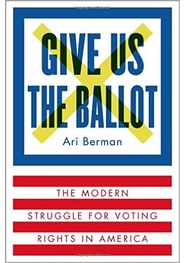
Book: Give Us The Ballot: The Modern Struggle for Voting Rights in America
Publisher's
Summary (Via Amazon):
The adoption of the landmark Voting Rights Act in 1965 enfranchised
millions of Americans and is widely regarded as the crowning
achievement of the civil rights movement. And yet fifty years later
we are still fighting heated battles over race, representation, and
political power—over the right to vote, the central pillar of our
democracy.
Ari Berman chronicles the transformative impact the
act had on American democracy and investigates how the fight over the
right to vote has continued in the decades since. From new strategies
to keep minorities out of the voting booth, to cynical efforts to
limit political representation by gerrymandering electoral districts,
to the Supreme Court's recent stunning decision that declared a key
part of the Voting Rights Act itself unconstitutional, Berman tells
the dramatic story of the pitched contest over the very heart of our
democracy.
Author: Ari Berman is a political correspondent for The Nation and an investigative journalism Fellow at the Nation Institute.
Reviewer: Jeffrey Rosen is president and chief executive of the National Constitution Center and a law professor at George Washington University.
Reviewer Highlights
" 'Give Us the Ballot' is an engrossing narrative history rather than constitutional analysis. Berman does not explore why justices who are devoted to the original understanding of the Constitution have repeatedly voted to narrow the scope of the Voting Rights Act with the argument that the equal protection clause of the 14th Amendment is colorblind. (In fact, as Justice John M. Harlan observed in his 1964 dissent from one of the original Supreme Court decisions regarding “one man, one-vote,” the framers of the 14th Amendment believed that the equal protection clause did not regulate voting or apportionment at all.) Still, Berman vividly shows that the power to define the scope of voting rights in America has shifted from Congress to the courts, a result that would have surprised the Reconstruction-era framers."
Comments: Honor Julian Bond’s Legacy by Protecting Voting Rights
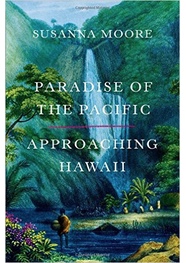
Book: Paradise of the Pacific: Approaching Hawai'i
Publisher's Summary (Via Amazon): The history of Hawaii may be said to be the story of arrivals--from the eruption of volcanoes on the ocean floor 18,000 feet below, the first hardy seeds that over millennia found their way to the islands, and the confused birds blown from their migratory routes, to the early Polynesian adventurers who sailed across the Pacific in double canoes, the Spanish galleons en route to the Philippines, and the British navigators in search of a Northwest Passage, soon followed by pious Protestant missionaries, shipwrecked sailors, and rowdy Irish poachers escaped from Botany Bay--all wanderers washed ashore, sometimes by accident. This is true of many cultures, but in Hawaii, no one seems to have left. And in Hawaii, a set of myths accompanied each of these migrants--legends that shape our understanding of this mysterious place.
Author: Susanna Moore
Reviewer: Jan Morris, a well-known travel writer.
Reviewer Highlights
"The novelist Susanna Moore (the author of two previous nonfiction books about Hawaii) handsomely contributes to all this with the unworthily titled “Paradise of the Pacific,” which sounds like a tourist brochure. Her book is in fact an astonishingly learned summation of the Hawaiian meaning, elegantly written, often delightfully entertaining and ultimately sad."
Comments: Susanna blogs about Hawaii here. If the author heeds the advice about the tourist-y sounding book title, she could go with the alternative title: "Kamehamehaaa!" Members of the 90's generation who are familiar with the television show Dragon Ball Z will know why.
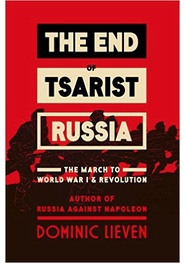
Book: The End of Tsarist Russia: The March to World War I and Revolution
Publisher’s
Summary (Via Amazon):
"World War I and the Russian Revolution together shaped the
twentieth century in profound ways. In The
End of Tsarist Russia,
acclaimed scholar Dominic Lieven connects for the first time the two
events, providing both a history of the First World War’s origins
from a Russian perspective and an international history of why the
revolution happened.
"Based on exhaustive work in seven
Russian archives as well as many non-Russian sources, Dominic
Lieven’s work is about far more than just Russia. By placing the
crisis of empire at its core, Lieven links World War I to the sweep
of twentieth-century global history. He shows how contemporary hot
issues such as the struggle for Ukraine were already crucial elements
in the run-up to 1914."
Author: Dominic Lieven is an authority on Russian history and post-Soviet politics and on Empire and European history.
Reviewer: Josef Joffe, the editor of Die Zeit in Hamburg, is a fellow of the Freeman-Spogli Institute and the Hoover Institution, both at Stanford University, where he also teaches international politics. His most recent book is “The Myth of America’s Decline.”
Reviewer Highlights
“Lieven had the good fortune of being able to scour previously closed Russian archives. His finds constitute the most intriguing parts of his book, making readers privy to the thinking of Russian officials and diplomats.
“To be sure, Lieven does offer what he calls a 'God’s-eye view' in his introduction. But he courts trouble when he shifts to his “worm’s-eye analysis,” personalizing and psychologizing, as if his Russian characters (often with German names like Lambsdorff, Witte or Osten-Sacken) wrote or even directed the play. Switching between 'God' and 'worm' raises a problem that bedevils all of social science. In everyday language: You can’t understand the forest by describing this or that tree, nor the tree by plucking some of the apples.
“To be fair, Lieven is well aware of the difficulty. And so, near the end of his book, he argues: 'Russian foreign policy can only be understood if one takes into account global contexts and comparisons.' But mingling 'macro' and 'micro' throughout forces him into exasperating diffidence. Sweeping generalizations are invariably followed by 'nevertheless' or 'this is not to claim that. . . .' These cautionary asides honor the scholar, but baffle the general reader.
“We should praise Lieven for digging deeper than many scholars before him, at least in the case of Russia.”
Comments: The reviewer remarked that "Switching between “God” and “worm” raises a problem that bedevils all of social science." I say, tell that to the sandworms of Dune!
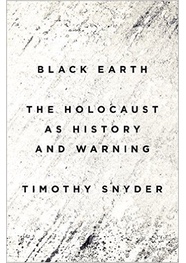
Book: Black Earth: The Holocaust as History and Warning
Publisher's Summary (Via Amazon): "Based on new sources from Eastern Europe and forgotten testimonies from Jewish survivors, Black Earth recounts the mass murder of the Jews as an event that is still close to us, more comprehensible than we would like to think, and thus all the more terrifying.
"The Holocaust began in a dark but accessible place, in Hitler's mind, with the thought that the elimination of Jews would restore balance to the planet and allow Germans to win the resources they desperately needed. Such a worldview could be realized only if Germany destroyed other states, so Hitler's aim was a colonial war in Europe itself. In the zones of statelessness, almost all Jews died. A few people, the righteous few, aided them, without support from institutions. Much of the new research in this book is devoted to understanding these extraordinary individuals. The almost insurmountable difficulties they faced only confirm the dangers of state destruction and ecological panic. These men and women should be emulated, but in similar circumstances few of us would do so.
"By overlooking the lessons of the Holocaust, Snyder concludes, we have misunderstood modernity and endangered the future. The early twenty-first century is coming to resemble the early twentieth, as growing preoccupations with food and water accompany ideological challenges to global order. Our world is closer to Hitler's than we like to admit, and saving it requires us to see the Holocaust as it was -- and ourselves as we are."
Author: Timothy Snyder, professor of history at Yale University.
Reviewer: Michael R. Marrus is a Canadian historian of France, the Holocaust and Jewish history. His latest book, “Lessons of the Holocaust,” will be published in December.
Reviewer Highlights
"To his credit, Snyder reaches more widely than most and deploys formidable linguistic skills.
"Snyder boldly asserts an unconventional interpretation of Holocaust history, connecting it to the Nazis’ deluded way of contending with an ecological crisis affecting the entire planet. Yet while this argument is central to his account, it is one of the book’s least fully explored themes. Its various strands come together only in a concluding chapter that unconvincingly ties mass killing to challenges of food scarcity and dwindling resources.
"Using the idioms of globalism, colonialism and ecology, Timothy Snyder’s book may promote warnings, but not because it unlocks a fresh understanding of the Holocaust. Rather, through its horrific descriptions, “Black Earth” elucidates human catastrophe in regions with which a Western audience needs to become more familiar. The book is not a guide to preserve humanity, as Snyder suggests in his closing remarks, but it is important enough to prompt reflection, as with much other learned Holocaust history, on the potential for human destructiveness that resides in a world of ill-understood global calamities."
Comments: ‘How the NYT Missed the Story of the Holocaust While It Was Happening.’
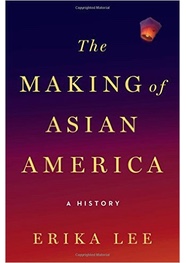
Book: The Making of Asian America: A History
Publisher's
Summary (Via Amazon):
The
Making of Asian America
tells the little-known history of Asian Americans and their role in
American life, from the arrival of the first Asians in the Americas
to the present-day.
An epic history of global journeys and new
beginnings, this book shows how generations of Asian immigrants and
their American-born descendants have made and remade Asian American
life in the United States: sailors who came on the first
trans-Pacific ships in the 1500s; indentured “coolies” who worked
alongside African slaves in the Caribbean; and Chinese, Japanese,
Filipino, Korean, and South Asian immigrants who were recruited to
work in the United States only to face massive racial discrimination,
Asian exclusion laws, and for Japanese Americans, incarceration
during World War II. Over the past fifty years, a new Asian America
has emerged out of community activism and the arrival of new
immigrants and refugees. No longer a “despised minority,” Asian
Americans are now held up as America’s “model minorities” in
ways that reveal the complicated role that race still plays in the
United States.
Published to commemorate the fiftieth
anniversary of the passage of the United States’ Immigration and
Nationality Act of 1965 that has remade our “nation of immigrants,”
this is a new and definitive history of Asian Americans. But more
than that, it is a new way of understanding America itself, its
complicated histories of race and immigration, and its place in the
world today.
Author: Erika Lee
Reviewer: Oliver Wang, a professor of sociology at California State University, Long Beach.
Reviewer Highlights
"Lee is a professor of history at the University of Minnesota, and she makes extensive use of both secondary and primary sources to collect the stories that go into the book. In that regard, “The Making of Asian America” shares strong similarities with other broad, inclusive Asian-American histories, most obviously Ronald Takaki’s “Strangers From a Different Shore,” first published in 1989. Lee’s book doesn’t radically depart from its predecessors so much as provide a useful and important upgrade by broadening the scope and, at times, deepening the investigations."
Comments: As far as this guy is concerned, you can serve fried rice in my melting pot anytime!
Extra Micro-reviews from the NYT Sunday Book Review: 4 Book Reviews About Nazis and the Holocaust
For Fun: 44 Important Parts of History You're Picturing Wrong